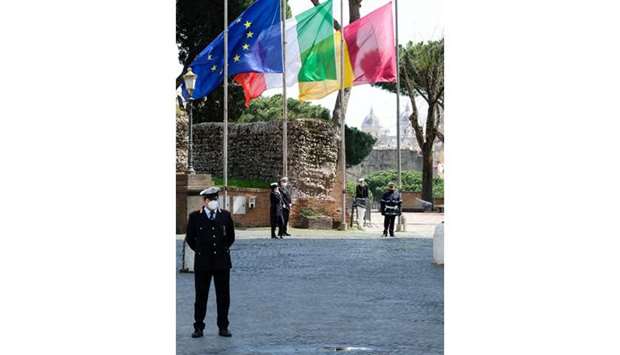A drastic and controversial tightening of the curfew to combat the spread of the novel coronavirus came into force yesterday in Spain as the 24-hour death toll hit a record.
Spain’s health ministry said the country saw 849 coronavirus-related deaths in the past 24 hours, the most in the country since the beginning of the outbreak, bringing the total number of deaths to 8,189.
Yesterday is the fourth day in the row that Spain registered more than 800 Covid-19 fatalities, equivalent to just over one death every two minutes.
The coronavirus causes the Covid-19 disease.
The number of recorded new infections also rose by 9,000, bringing the nation’s total to more than 94,000.
More than 2,500 patients were reported to have recovered, bringing the total number of recoveries to almost 20,000.
Prime Minister Pedro Sanchez announced at the weekend that all workers employed in non-essential sectors must stay home for approximately the next two weeks, a measure particularly affecting construction and large parts of industry.
From now on, soldiers are also supposed to initially monitor compliance with the curfew in 87 municipalities.
Rule breakers have already ended up behind bars.
So far, all citizens who could not work from home had been allowed to continue going to and from their workplaces as part of the emergency status that has been in effect since March 15.
All those affected should continue to receive their salary and make up for the hours they have not worked.
Many entrepreneurs and regional presidents have sharply criticised the new measures, claiming they will destroy up to 4mn jobs.
“That will not do! The government didn’t even ask us for advice,” Antonio Garamendi, president of the CEOE trade association, said in an interview with the radio station RNE.
The paralysing of the economy threatens “not only an economic but also a social crisis”, he said.
“We are being driven into bankruptcy,” not only innumerable employers and employees criticized, but also the president of the Spanish self-employed association ATA, Lorenzo Amor.
Meanwhile the opposition, which had tacitly supported Sanchez’s management of the crisis, openly withdrew that support yesterday.
“The costs [of coping with the crisis] must not be borne by the companies, they must be borne by the state,” said People’s Party (PP) head Pablo Casado.
According to a survey published on Monday by the NC Report institute, more than 80% of Spaniards believe that Sanchez – secretary-general of the Spanish Socialist Workers’ Party (PSOE) – reacted too late to the crisis.
Many do not understand why the government allowed a huge rally in Madrid on March 8 to mark International Women’s Day, at which tens of thousands took part, when the World Health Organisation (WHO) had already warned against mass events.
Among the participants at the rally, three members of the cabinet and also Sanchez’s wife Begona tested positive for the coronavirus.
The residents of Madrid, with more than 3,600 deaths of the 8,200 across Spain, wonder if this is why the capital is the epicentre of the country’s crisis.
People are also resentful that the government bought tens of thousands of defective test kits.
Sanchez can’t afford more mistakes, El Mundo warned.
The tightening of the curfew regulations is Sanchez’s “last bullet”, it wrote yesterday.
Sanchez’s PSOE won November’s parliamentary election but fell short of an absolute majority.
He formed a coalition government with the backing of the largest Catalan party in January after a long political impasse and two elections within a year.
After Italy, Spain is the country in Europe most severely affected by the coronavirus.

Municipal police officers stand at attention beside the flags of (from left) Europe, Italy and Rome, flying at half-mast during a minute of silence outside Rome’s city hall at Capitoline Hill (Campidoglio).
